Informal Language 美语中的非正式用语
英语中级听力:Formal language and informal language 正式语言和非正式语言(中英对照)
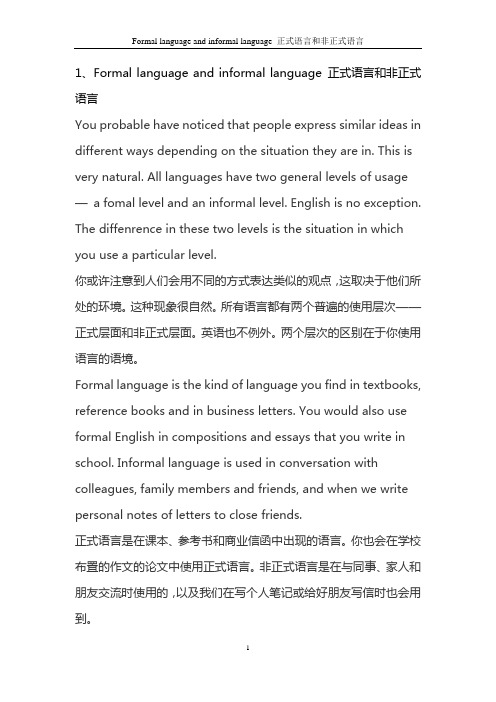
1、Formal language and informal language 正式语言和非正式语言You probable have noticed that people express similar ideas in different ways depending on the situation they are in. This is very natural. All languages have two general levels of usage —a fomal level and an informal level. English is no exception. The diffenrence in these two levels is the situation in which you use a particular level.你或许注意到人们会用不同的方式表达类似的观点,这取决于他们所处的环境。
这种现象很自然。
所有语言都有两个普遍的使用层次——正式层面和非正式层面。
英语也不例外。
两个层次的区别在于你使用语言的语境。
Formal language is the kind of language you find in textbooks, reference books and in business letters. You would also use formal English in compositions and essays that you write in school. Informal language is used in conversation with colleagues, family members and friends, and when we write personal notes of letters to close friends.正式语言是在课本、参考书和商业信函中出现的语言。
【双语美文】Formal language and Informal language正式语言和非正式语言
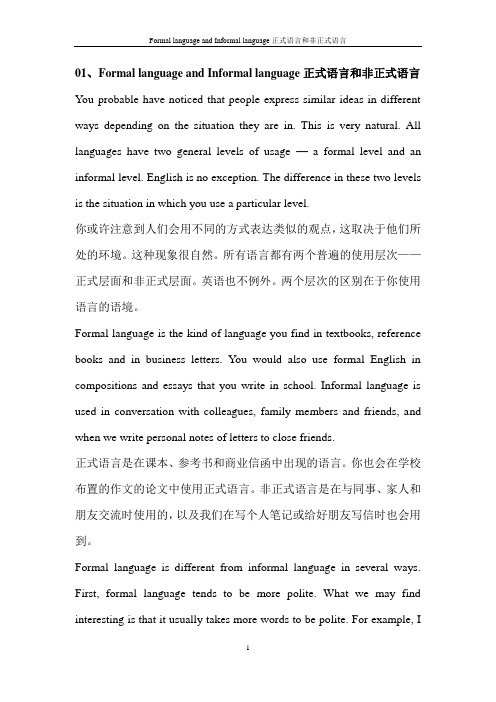
01、Formal language and Informal language正式语言和非正式语言You probable have noticed that people express similar ideas in different ways depending on the situation they are in. This is very natural. All languages have two general levels of usage —a formal level and an informal level. English is no exception. The difference in these two levels is the situation in which you use a particular level.你或许注意到人们会用不同的方式表达类似的观点,这取决于他们所处的环境。
这种现象很自然。
所有语言都有两个普遍的使用层次——正式层面和非正式层面。
英语也不例外。
两个层次的区别在于你使用语言的语境。
Formal language is the kind of language you find in textbooks, reference books and in business letters. You would also use formal English in compositions and essays that you write in school. Informal language is used in conversation with colleagues, family members and friends, and when we write personal notes of letters to close friends.正式语言是在课本、参考书和商业信函中出现的语言。
美国英语中的非正式用语

Informal Language 美语中的⾮正式⽤语 CEver go jogging in a business suit? What about going to a job interview in pajamas? Dressing appropriately is a lot like using a foreign language in the right way. It all depends on the situation. People in America use formal English for making speeches and writing business letters. But they prefer informal language when they talk to friends. Americans are fairly laid-back, both in styles of dress and in language. So to understand their culture, it pays to know something about informal language-in other words, English in blue jeans and a T-shirt. 你曾经穿著办公的西装慢跑吗?或者穿著睡⾐去应征⼯作?得体的穿著很像正确地使⽤外国语⾔,都得视情境⽽变化。
美国⼈使⽤正式的英⽂作演说和写商务信件;但是当他们和朋友谈话的时候,则较喜欢使⽤⾮正式的语⾔。
美国⼈不论是在穿著的风格或是语⾔上,都是⾮常轻松⾃在的。
所以要了解他们的⽂化,就得认识他们的⾮正式⽤语,换句话说,就像穿著⽜仔裤和T恤的英⽂。
English, like every language, is always changing. New slang terms are created all the time. Often they're here today, gone tomorrow. For instance, if you wanted to call something exciting in the 1960s, you would say it was groovy or far out. Today you might describe it as cool or even bad. Each sub-group of American society-from teenagers to soldiers to thieves to ethnic groups-has its own slang. People who aren't a part of the "in-group" can't understand the meaning, even though the words are "English." So it's not easy for outsiders to use slang correctly. 英语就像每⼀种语⾔⼀样是⼀直在变。
含informal的美句格言

1111
1. "informal learning is just as important as formal education, if not more so." - Ken Robinson
这句话强调了非正式学习的重要性,认为它与正式教育同样重要,甚至更为重要。
非正式学习是指通过日常生活中的经验、观察、实践等方式获得知识和技能,它是一种更加自主、灵活、个性化的学习方式。
2. "The best way to learn is by doing." -UNKNOWN
这是一句非常简洁而有力的非正式格言,它强调了实践的重要性。
学习不仅仅是理论上的知识积累,更重要的是通过实践来巩固和加深对知识的理解。
3. "informal meetings are often more productive than formal ones." -UNKNOWN
这句话表达了非正式会议的优点,认为它们通常比正式会议更富有成效。
非正式会议通常更加灵活、自由,可以促进与会者之间的交流和合作,从而更好地解决问题和达成共识。
4. "informal dress can be just as stylish as formal wear." -UNKNOWN
这句话传达了一个关于时尚的观点,即非正式着装同样可以很有风格。
它强调了个人风格和自信的重要性,认为穿着舒适、自信的服装同样可以展现出魅力和时尚感。
这些美句格言都含有informal 这个词汇,它们表达了一些关于学习、实践、会议和时尚的观点,展示了informal 在不同领域中的重要性和价值。
美国口语惯用语
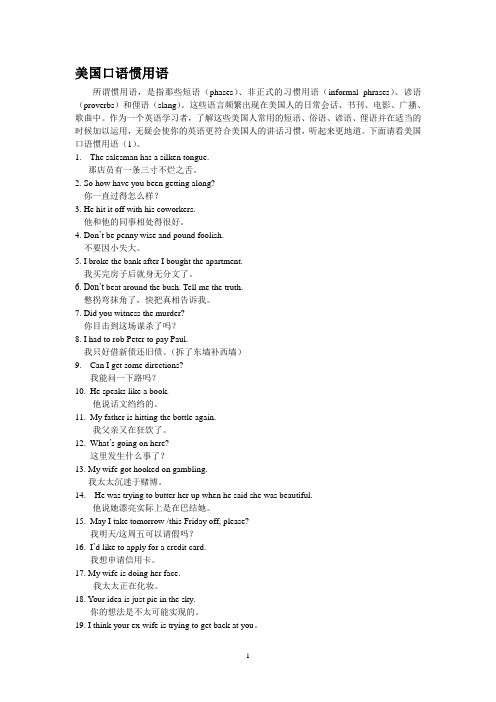
美国口语惯用语所谓惯用语,是指那些短语(phases)、非正式的习惯用语(informal phrases)、谚语(proverbs)和俚语(slang)。
这些语言频繁出现在美国人的日常会话、书刊、电影、广播、歌曲中。
作为一个英语学习者,了解这些美国人常用的短语、俗语、谚语、俚语并在适当的时候加以运用,无疑会使你的英语更符合美国人的讲话习惯,听起来更地道。
下面请看美国口语惯用语(1)。
1.The salesman has a silken tongue.那店员有一条三寸不烂之舌。
2. So how have you been getting along?你一直过得怎么样?3. He hit it off with his coworkers.他和他的同事相处得很好。
4. Don’t be penny wise and pound foolish.不要因小失大。
5. I broke the bank after I bought the apartment.我买完房子后就身无分文了。
6. Don’t beat around the bush. Tell me the truth.憋拐弯抹角了,快把真相告诉我。
7. Did you witness the murder?你目击到这场谋杀了吗?8. I had to rob Peter to pay Paul.我只好借新债还旧债。
(拆了东墙补西墙)9.Can I get some directions?我能问一下路吗?10.He speaks like a book.他说话文绉绉的。
11.My father is hitting the bottle again.我父亲又在狂饮了。
12.What’s going on here?这里发生什么事了?13. My wife got hooked on gambling.我太太沉迷于赌博。
14. He was trying to butter her up when he said she was beautiful.他说她漂亮实际上是在巴结她。
【双语美文】FormallanguageandInformallanguage正式语言和非正式语言

01、Formal language and Informal language 正式语言和非正式语言You probable have noticed that people express similar ideas in different ways depending on the situation they are in. This is very natural. All languages have two general levels of usage —a formal level and an informal level. English is no exception. The difference in these two levels is the situation in which you use a particular level. 你或许注意到人们会用不同的方式表达类似的观点,这取决于他们所处的环境。
这种现象很自然。
所有语言都有两个普遍的使用层次——正式层面和非正式层面。
英语也不例外。
两个层次的区别在于你使用语言的语境。
Formal language is the kind of language you find in textbooks, reference books and in business letters. You would also use formal English in compositions and essays that you write in school. Informal language is used in conversation with colleagues, family members and friends, and when we write personal notes of letters to close friends. 正式语言是在课本、参考书和商业信函中出现的语言。
formal ang informal language

1.现在分词短语与从句 正式:Living in the country, we had few social visits. 非正式:Since we lived in the country, nobody visited us. 2.强调句与非强调句 正式:It is more time that we need. 非正式:We need more time. 3.介词位置 正式:With what did he write the letter? 非正式:What did he write the letter with? 4.倒装 正式:Under no circumstance should the door be left unlocked. 非正式:This subjects we have examined in an earlier chapter.
Words used in formal and informal language
1.one和you表示“任何人” 正式:One never knows what may happen. 非正式:You never know what may happen. 2.majority和most表示“大多数” 正式:The majority of the passengers were rescued 非正式:Most of the passengers were rescued 3.wish和want表示"意愿" 正式:The manager wishes to thank you for your cooperation. 非正式:The manager wants to thank you for your cooperation.
辨别和使用正式与非正式词汇

辨认和使用正式与非正式词汇戴维德帕克有位准备雅思考试(国际英语测试系统)的考生曾经问我这样一个问题:“我不知道“spark off”是否是正式用语。
怎样才能辨别出正式用语和非正式用语呢?”以下就是我的回答:英语中有三种主要文体格式:正式英语,非正式英语,流行英语。
正式英语正式英语主要应用于写作中。
这种文体格式通常带有学术性的写作口吻,通常见于学术课本,大学论文,商业信函和合同中。
在口语表达方面,正式英语通常只用于官方或正式场合,例如,在大学毕业典礼上正式欢迎来宾。
正式英语比日常用语使用更多的复杂词汇。
例如,正式用语常常比日常对话使用“更庞大”的词汇。
如以下几个多音节词compensate, ascend和interrogate。
正式用语还常常使用单个动词(如establish)来代替简单的短语动词(如set up)。
此外,在正式用语中还要尽量避免俚语和口语的出现。
当正式用语应用于写作中时,句子通常较长,较为复杂,也应严格遵循语法规则。
正式写作中,通常较为客观,经常使用it这样的非人称代词和动词的被动形式。
应该尽量避免缩略语和缩写单词的出现。
非正式英语和流行英语非正式英语是大多数人们日常所说的英语。
非正式英语广泛应用于电子邮件和朋友书信中。
使用非正式英语的人们对词汇的选择不太在意,如:非正式英语使用很多较短的单词(如fire, climb和ask),使用许多口语词汇(如stuff, a lot of, thing和sort of),还很使用一些短语动词(如使用set up ,而不用establish)。
非正式英语在语法上没有正式英语要求严格,常使用简单的语法结构和比较松散的句子或短语。
在写作中,非正式英语比正式英语常常使用更加个人化的文体,常用第一,第二人称(例如I ,you, we)。
缩写单词(如常常使用it’s,而不是it is)也常常见于非正式英语之中。
而且,非正式英语比正式的写作句式通常更短。
FORMALANDINFORMAL正式与非正式英文

inclined to using more formal words and styles?
Formal and informal
Formal and informal words and/or language of English should both be learned. Formal language is usually used in term papers, research papers, reports, memos, minutes of meeting, and business letters etc, in which case, formal style of language should be used. Formal language is sometimes called written or academic language.
Formal and informal
On the other hands, informal writing assumes a personal stance. It suggest close connections among writer, reader, and subject. Informal writing is usually used in daily conversations, notes, messages, personal letters, postcards etc.
Formal and informal
• 4. Don't use `don't', or any other shortened negative such as `isn't', `hasn't', `wasn't', etc. Use `does not', `is not', etc. instead.
如何辨认雅思中的正式与非正式词汇

如何辨认雅思中的正式与非正式词汇英语中有三种主要文体格式:正式英语,非正式英语,流行英语。
正式英语主要应用于写作中。
这种文体格式通常带有学术性的写作口吻,通常见于学术课本,大学论文,商业信函和合同中。
在口语表达方面,正式英语通常只用于官方或正式场合,例如,在大学毕业典礼上正式欢迎来宾。
正式英语比日常用语使用更多的复杂词汇。
例如,正式用语常常比日常对话使用“更庞大”的词汇。
如以下几个多音节词compensate, ascend 和interrogate。
正式用语还常常使用单个动词(如establish)来代替简单的短语动词(如setup)。
此外,在正式用语中还要尽量避免俚语和口语的出现。
当正式用语应用于写作中时,句子通常较长,较为复杂,也应严格遵循语法规则。
正式写作中,通常较为客观,经常使用it这样的非人称代词和动词的被动形式。
应该尽量避免缩略语和缩写单词的出现。
非正式英语和流行英语非正式英语是大多数人们日常所说的英语。
非正式英语广泛应用于电子邮件和朋友书信中。
使用非正式英语的人们对词汇的选择不太在意,如:非正式英语使用很多较短的单词(如fire, climb和ask),使用许多口语词汇(如stuff, alot of, thing和sort of),还很使用一些短语动词(如使用set up,而不用establish)。
非正式英语在语法上没有正式英语要求严格,常使用简单的语法结构和比较松散的句子或短语。
在写作中,非正式英语比正式英语常常使用更加个人化的文体,常用第一,第二人称(例如I ,you, we)。
缩写单词(如常常使用it's,而不是itis)也常常见于非正式英语之中。
而且,非正式英语比正式的写作句式通常更短。
在正式英语写作中,常常使用较为正式的标点符号——而避免分号“;”和冒号“:”的出现,非正式英语则可以出现。
流行英语很少应用于写作中,大多是用于口语之中。
非正式英语中包括大量的俚语。
选词(正式与非正式)

Word Choice1.Formal vs. Informal正式/非正式语言学家Joos曾根据正式程度(level of formality)将语言分为五个级别:刻板体frozen,正式体formal,询议体consultative,随便体casual ,亲密体intimate。
例:刻:Visitor would make their way at once to the upper floor by way of the staircase.正:Visitors should go up to the stairs at once.询:Would you mind going upstairs right away, please?随:Time you all went upstairs now.亲:Up you go, chaps!刻板体用于专业书面语或庄严的演讲。
正式体一般用于书面语或公众演讲,它的主要目的是传播信息。
询议体属于中间性的标准语体,它用语比较准确,发音清楚,句法相当完整,语意表达充分,是其他各种语体的基础。
随便体用于熟人、朋友和“知情者”,其特点是:一省略句法,二使用俚语。
亲密体用于最熟悉的人之间,其特点高度删节,使用行话jargon. 语体的正式程度与交际方式有密切的联系。
Written English tends to be formal.Spoken English tends to be informal.举例:1.You’re extremely talkative. (formal)You talk a lot. (informal)You’re an old wind bag. (slang)2.At what time shall we dine?(formal)When do we eat?(informal)When do we put on the feet bag?(slang)3. A rich woman was killed last night.(formal)Someone killed a rich woman last night.(colloquial)4. Through the window, came in the sweet song.(formal)The sweet song came in through the window.(colloquial)5. The college requires all the students to submit their essay by a given time.(fl)I’ve got to hand in this essay by tomorrow.(colloquial)Formal informal colloquialGentleman man guy, chapImpoverished poorWealthy richIntelligent smart brightAutomobile carTelevision TVPornography sexTolerate stand/bear put up withEntertainment play/games funPleasure fun funLovely lovely cute2. Laudatory (commendatory )words vs. derogatory words褒贬义Examples:They live in a small town.I can never forget the little town where I spent my happy childhood.Modest and hardworking, he made very quick progress at school.He is man of mean birth.He is poor but not abject in his manner.Your niece impressed me as sweet and _____.(childlike/childish)Is that ______ (elderly/old) gentleman sitting on the bench your father?You must be _____ and do what you think best. (resolute/ stubborn)Why were you so ____ about your achievements? (modest/humble)Commendatory words derogatory wordsStatesman politicianLittle smallModest humbleBe interested in be addicted toBe absorbed in indulge oneself inBe engaged inBe keen onInfluence affect3.exactness of words’ meaning 准确A judge must be _____ in the case he tries. (disinterested/uninterested)The president spoke on radio to the ______ .( nation/land)On this ______ spot, a battle was fought which changed the history of the world. (historic/historical)People are serious and ______ at religious services.(respectful/respectable)She _____ to have lunch with her friend, saying that she wasn’t feeling well.(declined/refused) 4.vividness生动general meaning vs. specific meaninga.The wind was blowing in my face.b.The gentle breeze was caressing my cheeks tenderly.a.The clouds were passing overhead.b.The fleecy clouds were sailing leisurely along the azure (天蓝色的)sky.a.Some children stood anxiously at the counter.b.Four little urchins in ragged blue jeans stood with their smudgy faces pressed against thecandy counter.a.It is very cold.b.The biting cold pierced through my bones.Laugh, smile, grin露齿而笑, beam 微笑, giggle偷偷笑, titter吃吃地笑, chuckle轻声地笑, guffaw捧腹地笑, chortle咯咯地笑。
如何合理正式和非正式用语
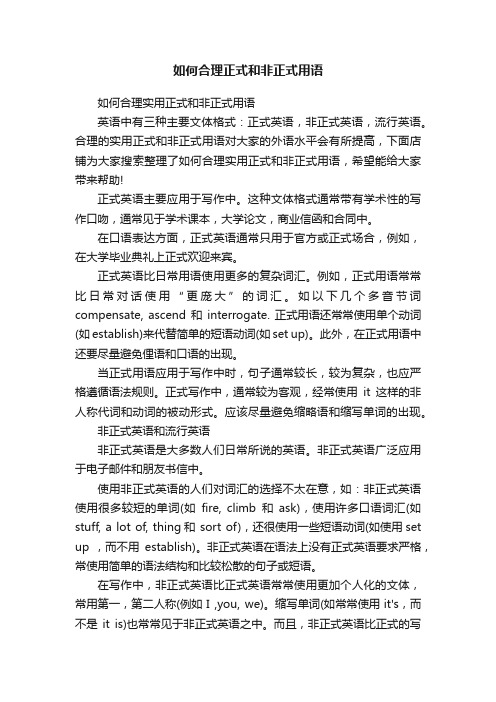
如何合理正式和非正式用语如何合理实用正式和非正式用语英语中有三种主要文体格式:正式英语,非正式英语,流行英语。
合理的实用正式和非正式用语对大家的外语水平会有所提高,下面店铺为大家搜索整理了如何合理实用正式和非正式用语,希望能给大家带来帮助!正式英语主要应用于写作中。
这种文体格式通常带有学术性的写作口吻,通常见于学术课本,大学论文,商业信函和合同中。
在口语表达方面,正式英语通常只用于官方或正式场合,例如,在大学毕业典礼上正式欢迎来宾。
正式英语比日常用语使用更多的复杂词汇。
例如,正式用语常常比日常对话使用“更庞大”的词汇。
如以下几个多音节词compensate, ascend 和interrogate. 正式用语还常常使用单个动词(如establish)来代替简单的短语动词(如set up)。
此外,在正式用语中还要尽量避免俚语和口语的出现。
当正式用语应用于写作中时,句子通常较长,较为复杂,也应严格遵循语法规则。
正式写作中,通常较为客观,经常使用it这样的非人称代词和动词的被动形式。
应该尽量避免缩略语和缩写单词的出现。
非正式英语和流行英语非正式英语是大多数人们日常所说的英语。
非正式英语广泛应用于电子邮件和朋友书信中。
使用非正式英语的人们对词汇的选择不太在意,如:非正式英语使用很多较短的单词(如fire, climb和ask),使用许多口语词汇(如stuff, a lot of, thing和 sort of),还很使用一些短语动词(如使用set up ,而不用establish)。
非正式英语在语法上没有正式英语要求严格,常使用简单的语法结构和比较松散的句子或短语。
在写作中,非正式英语比正式英语常常使用更加个人化的文体,常用第一,第二人称(例如I ,you, we)。
缩写单词(如常常使用it's,而不是it is)也常常见于非正式英语之中。
而且,非正式英语比正式的写作句式通常更短。
在正式英语写作中,常常使用较为正式的标点符号——而避免分号“;”和冒号“:”的出现,非正式英语则可以出现。
informal的缩写

informal的缩写定义与释义单词:informal1.1 词性:形容词1.2 释义:非正式的;不拘礼节的;口语体的;非正规的。
用于描述行为、语言、场合、服装等不遵循严格的正式规则或礼仪规范,较为随意、轻松自在的状态。
1.3 英文解释:Not formal; relaxed and friendly; not following strict official or traditional rules.1.4 相关词汇:同义词:casual, unofficial, relaxed反义词:formal, official派生词:informally(副词,非正式地),informality(名词,非正式;不拘礼节)2 起源与背景2.1 词源:源自拉丁语“informalis”,其中“in-”表示“不”,“formalis”表示“形式的”,所以合起来就是“没有形式的,非正式的”。
2.2 趣闻:在一些文化中,如在古希腊的哲学讨论中,除了正式的讲学场所,学者们也常在非正式的聚会场所,如花园、广场等地方进行思想交流。
这种非正式的交流氛围往往能激发更多新奇的观点和热烈的讨论,与在正式讲堂中的严肃氛围形成鲜明对比。
这也体现了“informal”环境在促进思想碰撞方面的独特价值。
3 常用搭配与短语3.1 短语:informal meeting:非正式会议例句:We had an informal meeting in the coffee shop to discuss the new project.翻译:我们在咖啡店开了个非正式会议来讨论新项目。
informal dress:便装例句:The party has an informal dress code, so you can wear jeans and a T-shirt.翻译:这个派对有着便装要求,所以你可以穿牛仔裤和T 恤。
informal conversation:闲聊;非正式交谈例句:We had an interesting informal conversation about our hobbies.翻译:我们就我们的爱好进行了一次有趣的非正式交谈。
如何辨认和使用正式与非正式词汇

英语中有三种主要文体格式:正式英语,非正式英语,流行英语。
正式英语正式英语主要应用于写作中。
这种文体格式通常带有学术性的写作口吻,通常见于学术课本,大学论文,商业信函和合同中。
在口语表达方面,正式英语通常只用于官方或正式场合,例如,在大学毕业典礼上正式欢迎来宾。
正式英语比日常用语使用更多的复杂词汇。
例如,正式用语常常比日常对话使用“更庞大”的词汇。
如以下几个多音节词compensate,ascend和interrogate。
正式用语还常常使用单个动词(如establish)来代替简单的短语动词(如set up)。
此外,在正式用语中还要尽量避免俚语和口语的出现。
当正式用语应用于写作中时,句子通常较长,较为复杂,也应严格遵循语法规则。
正式写作中,通常较为客观,经常使用it这样的非人称代词和动词的被动形式。
应该尽量避免缩略语和缩写单词的出现。
非正式英语和流行英语非正式英语是大多数人们日常所说的英语。
非正式英语广泛应用于电子邮件和朋友书信中。
使用非正式英语的人们对词汇的选择不太在意,如:非正式英语使用很多较短的单词(如fire, climb和ask),使用许多口语词汇(如stuff, a lot of, thing和sort of),还很使用一些短语动词(如使用set up ,而不用establish)。
非正式英语在语法上没有正式英语要求严格,常使用简单的语法结构和比较松散的句子或短语。
在写作中,非正式英语比正式英语常常使用更加个人化的文体,常用第一,第二人称(例如I ,you, we)。
缩写单词(如常常使用it’s,而不是it is)也常常见于非正式英语之中。
而且,非正式英语比正式的写作句式通常更短。
在正式英语写作中,常常使用较为正式的标点符号---而避免分号(;)和冒号(:)的出现,非正式英语则可以出现。
流行英语很少应用于写作中,大多是用于口语之中。
非正式英语中包括大量的俚语。
俚语就是一些非正式的,在礼节性的演讲和正式场合常常被看作不合适的单词或短语表达。
雅思指导:辨认和使用正式与非正式词汇

雅思指导:辨认和使用正式与非正式词汇有位准备雅思考试(国际英语测试系统)的考生曾经问我这样一个问题:“我不知道“spark off”是否是正式用语。
怎样才能辨别出正式用语和非正式用语呢?”以下就是我的回答:英语中有三种主要文体格式:正式英语,非正式英语,流行英语。
正式英语正式英语主要应用于写作中。
这种文体格式通常带有学术性的写作口吻,通常见于学术课本,大学论文,商业信函和合同中。
在口语表达方面,正式英语通常只用于官方或正式场合,例如,在大学毕业典礼上正式欢迎来宾。
正式英语比日常用语使用更多的复杂词汇。
例如,正式用语常常比日常对话使用“更庞大”的词汇。
如以下几个多音节词compensate, ascend 和interrogate。
正式用语还常常使用单个动词(如establish)来代替简单的短语动词(如set up)。
此外,在正式用语中还要尽量避免俚语和口语的出现。
当正式用语应用于写作中时,句子通常较长,较为复杂,也应严格遵循语法规则。
正式写作中,通常较为客观,经常使用it这样的非人称代词和动词的被动形式。
应该尽量避免缩略语和缩写单词的出现。
非正式英语和流行英语非正式英语是大多数人们日常所说的英语。
非正式英语广泛应用于电子邮件和朋友书信中。
使用非正式英语的人们对词汇的选择不太在意,如:非正式英语使用很多较短的单词(如fire, climb和ask),使用许多口语词汇(如stuff, a lot of, thing和sort of),还很使用一些短语动词(如使用set up ,而不用establish)。
非正式英语在语法上没有正式英语要求严格,常使用简单的语法结构和比较松散的句子或短语。
在写作中,非正式英语比正式英语常常使用更加个人化的文体,常用第一,第二人称(例如I ,you, we)。
缩写单词(如常常使用it’s,而不是it is)也常常见于非正式英语之中。
而且,非正式英语比正式的写作句式通常更短。
辨认和使用正式与非正式词汇
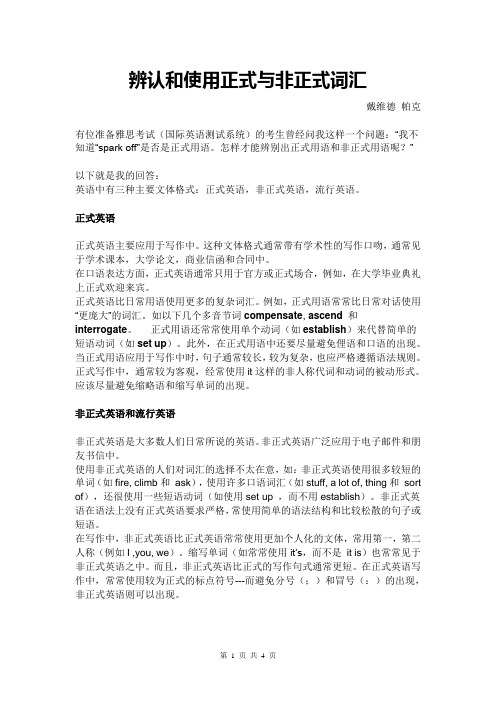
辨认和使用正式与非正式词汇戴维德帕克有位准备雅思考试(国际英语测试系统)的考生曾经问我这样一个问题:“我不知道“spark off”是否是正式用语。
怎样才能辨别出正式用语和非正式用语呢?”以下就是我的回答:英语中有三种主要文体格式:正式英语,非正式英语,流行英语。
正式英语正式英语主要应用于写作中。
这种文体格式通常带有学术性的写作口吻,通常见于学术课本,大学论文,商业信函和合同中。
在口语表达方面,正式英语通常只用于官方或正式场合,例如,在大学毕业典礼上正式欢迎来宾。
正式英语比日常用语使用更多的复杂词汇。
例如,正式用语常常比日常对话使用“更庞大”的词汇。
如以下几个多音节词compensate, ascend和interrogate。
正式用语还常常使用单个动词(如establish)来代替简单的短语动词(如set up)。
此外,在正式用语中还要尽量避免俚语和口语的出现。
当正式用语应用于写作中时,句子通常较长,较为复杂,也应严格遵循语法规则。
正式写作中,通常较为客观,经常使用it这样的非人称代词和动词的被动形式。
应该尽量避免缩略语和缩写单词的出现。
非正式英语和流行英语非正式英语是大多数人们日常所说的英语。
非正式英语广泛应用于电子邮件和朋友书信中。
使用非正式英语的人们对词汇的选择不太在意,如:非正式英语使用很多较短的单词(如fire, climb和ask),使用许多口语词汇(如stuff, a lot of, thing和sort of),还很使用一些短语动词(如使用set up ,而不用establish)。
非正式英语在语法上没有正式英语要求严格,常使用简单的语法结构和比较松散的句子或短语。
在写作中,非正式英语比正式英语常常使用更加个人化的文体,常用第一,第二人称(例如I ,you, we)。
缩写单词(如常常使用it’s,而不是it is)也常常见于非正式英语之中。
而且,非正式英语比正式的写作句式通常更短。
- 1、下载文档前请自行甄别文档内容的完整性,平台不提供额外的编辑、内容补充、找答案等附加服务。
- 2、"仅部分预览"的文档,不可在线预览部分如存在完整性等问题,可反馈申请退款(可完整预览的文档不适用该条件!)。
- 3、如文档侵犯您的权益,请联系客服反馈,我们会尽快为您处理(人工客服工作时间:9:00-18:30)。
Informal Language
美语中的非正式用语
Ever go jogging in a business suit?
What about going to a job interview in pajamas?
Dressing appropriately is a lot like using a foreign language in the right way. It all depends on the situation. People in America use formal English for making speeches and writing business letters. But they prefer informal language when they talk to friends. Americans are fairly laid-back, both in styles of dress and in language. So to understand their culture, it pays to know something about informal language-in other words, English in blue jeans and a T-shirt.
你曾经穿著办公的西装慢跑吗?或者穿著睡衣去应征工作?
得体的穿著很像正确地使用外国语言,都得视情境而变化。
美国人使用正式的英文作演说和写商务信件;但是当他们和朋友谈话的时候,则较喜欢使用非正式的语言。
美国人不论是在穿著的风格或是语言上,都是非常轻松自在的。
所
以要了解他们的文化,就得认识他们的非正式用语,换句话说,就像穿著牛仔裤和T恤的英文。
English, like every language, is always changing. New slang terms are created all the time. Often they're here today, gone tomorrow. For instance, if you wanted to call something exciting in the 1960s, you would say it was groovy or far out. Today you might describe it as cool or even bad. Each sub-group of American society-from teenagers to soldiers to thieves to ethnic groups-has its own slang. People who aren't a part of the "in-group" can't understand the meaning, even though the words are "English." So it's not easy for outsiders to use slang correctly.
英语就像每一种语言一样是一直在变。
新的俚语不断地出现,常常今天还在使用的,明天就被淘汰了。
例如,在一九六O年代你若要形容一件很兴奋的事,你会说很「groovy」美好的,或是「far out」走在时代尖端的。
而今天会形容为「cool」很酷,甚至「bad」好菜喔。
从青少年、军人、小偷、到少数民族,美国社会中每一种附属团体都有自己的俚语。
即使它们确实是英语,但是不属于那个团体的人就不会明白它的意思。
因此局外人要正确地使用俚语实在不容易。
Like many languages, American English has numerous idioms that paint word pictures. These colorful expressions come from everyday life and add spice to language. When Americans want to make a good first impression on someone, they try to put their best foot forward. That way, they won't get off on the wrong foot in their relationship. Learning about idioms in a language and culture can be difficult, but don't get cold feet. Just be careful when using these expressions. Otherwise, you might put your foot in your mouth.
就像许多的语言一样,美语中也有许多的成语,刻画出文字的图像。
这些多样化的表达方式来自于每天的生活,并为语言增添了许多风味。
当美国人想要给
某人良好的第一印象时,他们会先「伸出最好的那一只脚」(表现较好的一面);如此,在他们的关系上就不会「下错脚」(搞砸)了。
学习一个语言和文化中的成语可能相当困难,但是也不要「让脚发寒了」(恐惧、受挫),只要在用的时候小心一点就是了。
否则你可能会「把脚放进嘴巴里去了」(说错话)。
Americans enjoy making things easy on themselves. Even their pronunciation is relaxed. Sounds or syllables that are not stressed are shortened or combined with other sounds. As a result, "What do you want to do?" becomes "Whaddaya wanna do?" And "I don't know" sounds like "I dunno." See if you can understand the following conversation:
Gene: Jeet yet?
Tim: No, ju?
Gene: Skoeet!
Now let's translate it into regular English:
Gene: Did you eat yet?
Tim: No, did you?
Gene: Let's go eat!
School teachers probably cringe at this kind of pronunciation. But the fact is, that's how Americans often talk in real-life situations.。
